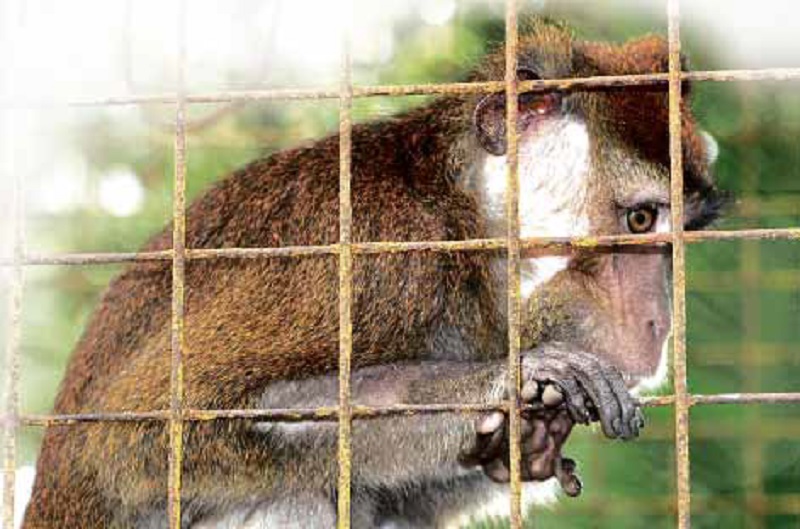Lawyers warn vs keeping wild animals as pets

ONE OF twomacaques turned over to DENR agents in Quezon province. DELFIN T. MALLARI JR./INQUIRER SOUTHERN LUZON
LUCENA CITY—A group of lawyers specializing in the protection of the environment urged the public to refrain from keeping wild animals as pets and removing them from their natural habitats.
An official of Tanggol Kalikasan (TK), a public interest law office which advocates environmental protection, made the remarks after two macaques were turned over to Department of Environment and Natural Resources agents.
“Don’t buy them (wild ani mals),” said Zeny Bernal, TK program officer. “Reject them if they will be given as gift. Having them is against the law,” Bernal said.
Aquiring, possession, transporting and trading wildlife species require permit from the DENR in accordance with the provisions of Republic Act 9147 or the Wildlife Resources Conservation and Protection Act.
On Thursday, a beach resort owner in nearby Sariaya town has voluntarily turned over two Philippine long-tailed macaques or monkey (Macaca fascicularis) to the DENR.
Citing information from the resort owners, Bernal said the male monkey had been caged for the past seven years while the female for three years.
Both monkeys, which were just given to the owners, had since been an added attraction to the guests of the resort fronting Tayabas Bay. But with their long years inside the steel cage, the monkeys have become aggressive, frightening resort visitors.
Bernal said the resort owners contacted TK for the turnover of the monkeys to the DENR.
She said the owner of the beach resort has been absolved of criminal liability.
“They voluntarily surrendered the animals. What we did is soft approach of law enforcement. But it is also a public warning,” Bernal said.
Dr. Milcah Valente, head of animal health and welfare center-Provincial Veterinary Office, described the monkeys as “physically healthy.” The monkeys were brought to DENR Wildlife Rescue Center in Calauan, Laguna.
The long-tailed monkey, also known as crab-eating monkeys, usually live in the periphery of forests, riverine and mangrove areas. Its tail has an average length of 50 to 60 centimeters.
The Philippine long tailed monkey is on the list of “near threatened” species of the International Union for Conservation of Nature (IUCN) as its population has been suffering a decline due to hunting and habitat loss.














